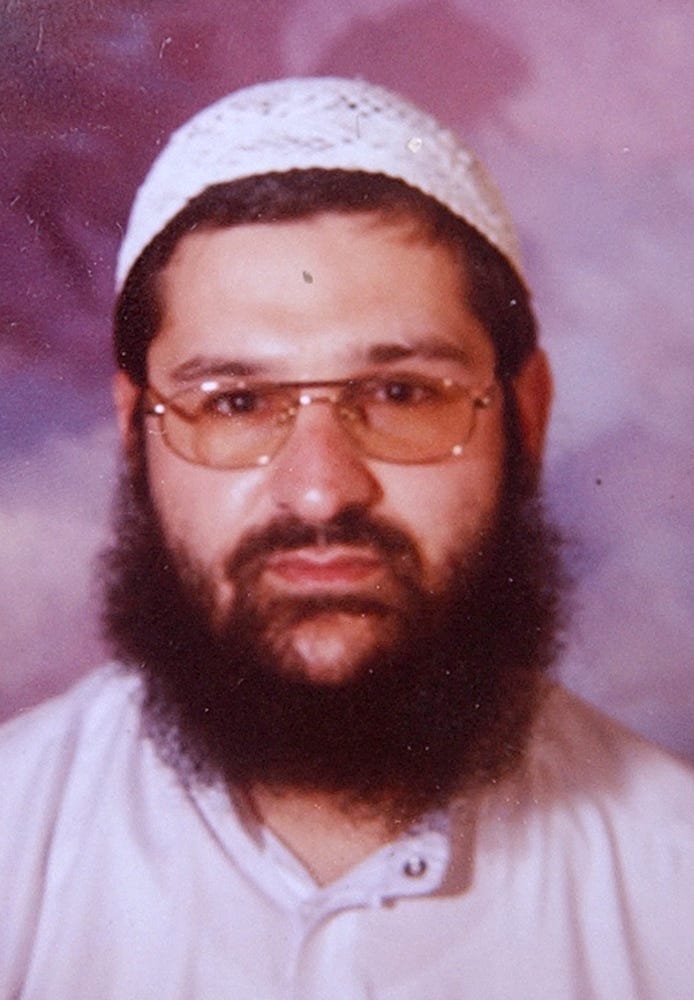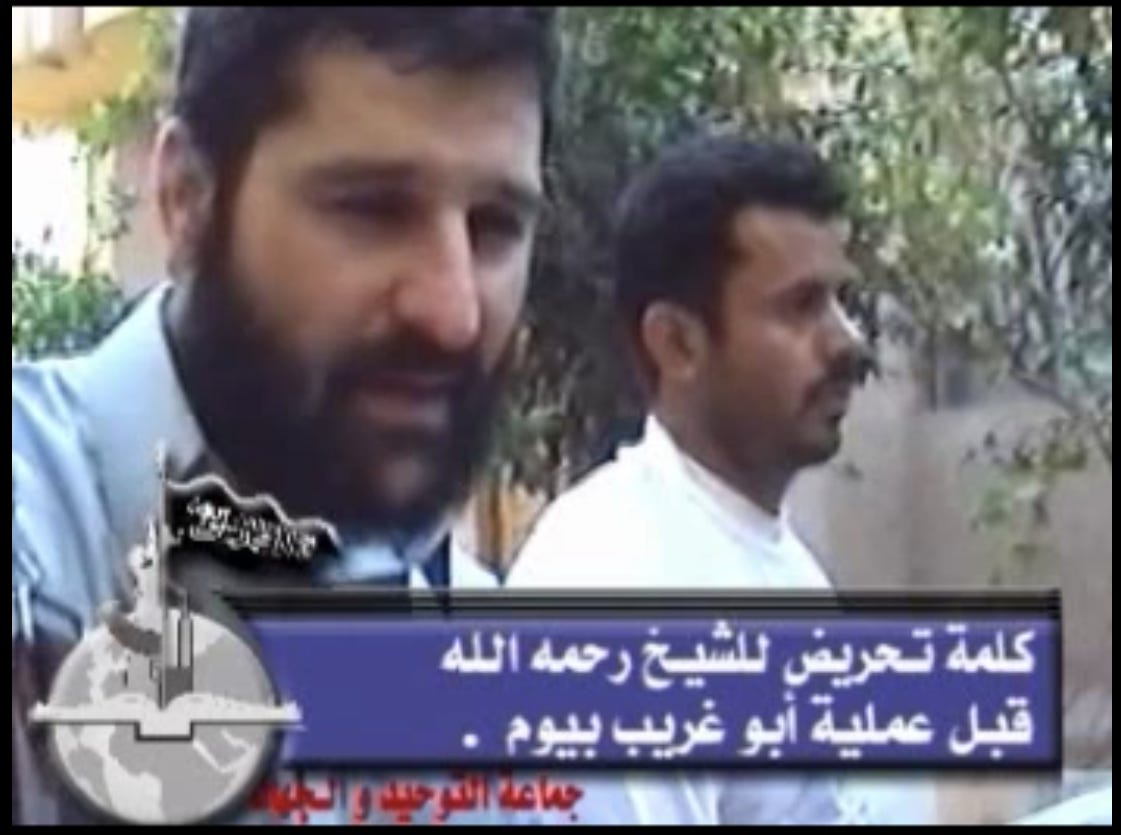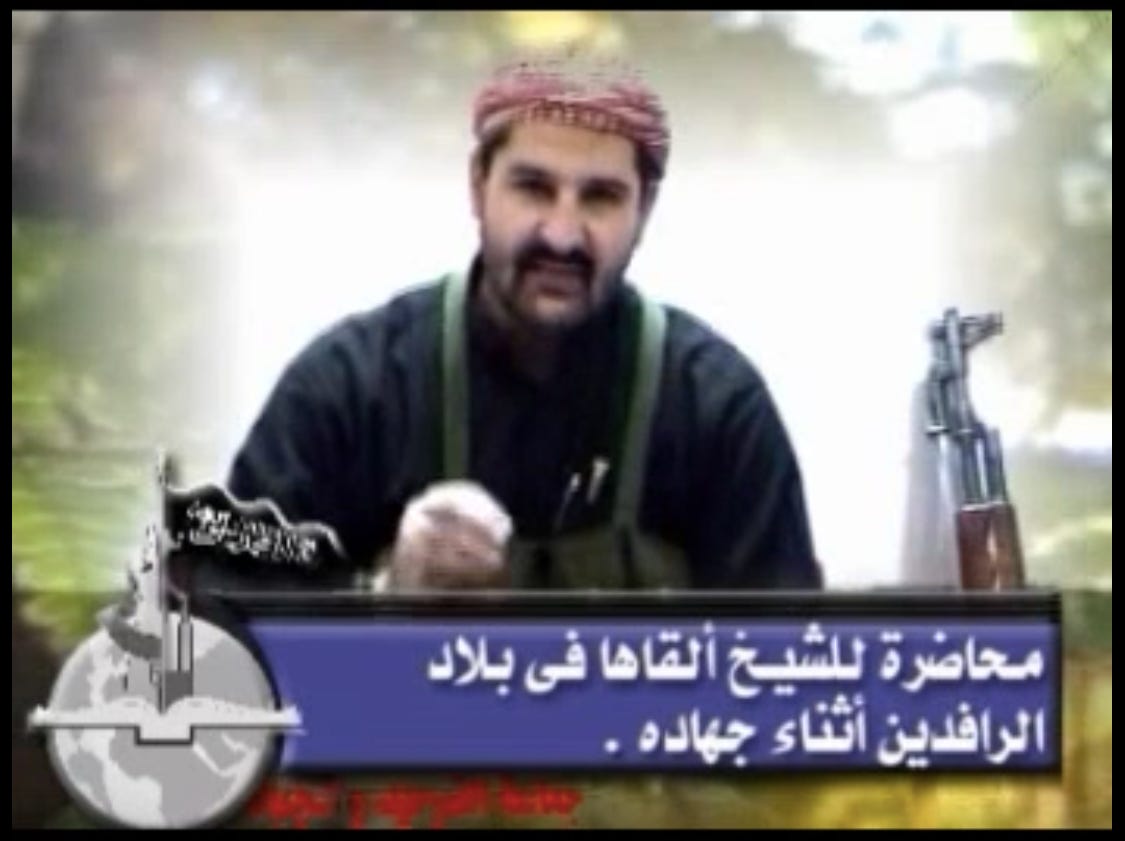From the Biographies of the Distinguished Martyrs: (37) Abu Anas al-Shami
Umar Yusuf Jum’ah aka Abu Anas al-Shami
The thirty-seventh “distinguished martyr” is the Islamic State cofounder Abu Anas al-Shami. This is another extremely key reference on early IS history, though there is an unusual error, to be addressed below.
Abu Anas was a Palestinian refugee, born in Kuwait in 1969 but expelled in 1991, eventually settling in Jordan. In the mid-1990s, he moved to Bosnia where he preached Salafism in towns and refugee camps. He later returned to Jordan, again working as a Salafi preacher in the Sweileh neighborhood of Amman. During this time, he formed the “Imam al-Bukhari Center” and began to agitate against King Abdullah, leading to his arrest. After Abu Anas was released in 2003, he headed to Iraq. It is not stated when Abu Anas met Zarqawi, but it was likely while both were still in Jordan. Abu Anas significantly influenced Zarqawi’s ideological outlook, particularly about Shiites.
Upon entering Iraq, Abu Anas made contact with the Iraqi jihadist underground, first staying with Abu Zahra al-Issawi (forthcoming). He joined Abu Muhammad al-Lubnani’s network operating out of the Rawah Camp, soon becoming the camp’s general emir, as reported by Abu Muhammad al-Salmani. At some point in Rawah, he and eleven others met and officially formed Jama’at al-Tawhid wal-Jihad. Abu Anas became a top leader of JTJ and one of Zarqawi’s closest advisors. Although not stated here, he played a key role in recruiting Iraqis to JTJ.
The first major test of Abu Anas was the First Battle of Fallujah. Abu Ismail al-Muhajir reports that Abu Anas made four key contributions: motivating the fighters, advising the fighters, forming the Fallujah war council with Umar Hadid and Abu Azzam, and leading all political negotiations. With the insurgent success in Fallujah, the next stage was to consolidate JTJ’s political achievements. Alongside Abu Azzam, Abu Anas led the efforts against the Muslim Brotherhood, Sufis, and other non-Salafi Jihadist elements in Fallujah. In particular, he formed the Mujahidin Shura Council of Fallujah, which monopolized political power in the city and gave special importance to JTJ and Zarqawi’s authority. Furthermore, Abu Anas began to proselytize JTJ’s message and organized the mergers of many local Iraqi groups into JTJ’s ranks. This began in Fallujah, then the city’s environs, and then onto Baghdad. Although not mentioned here, Abu Anas organized throughout Anbar, recruiting future Islamic State leader Abu Umar al-Baghdadi and bringing Jaysh al-Taifah al-Mansurah into JTJ’s ranks. Abu Ismail emphasizes Abu Anas’s key role in turning Samarra into a JTJ stronghold “like Fallujah or even stronger.” By late 2004, one can say that JTJ had become a fully Iraqified and powerful jihadist organization operating throughout Iraq.
Strangely, Abu Ismail incorrectly reports that Abu Anas was killed by an airstrike in Fallujah. In fact, Abu Anas was among the relative few to survive Fallujah and later died during the raid on Abu Ghraib prison. Below is an image of him one day prior to the raid.
“A word of incitement by the Shaykh (may God have mercy on him) one day before the Abu Ghraib raid.”
It is unclear why Muhajir reported that Abu Anas died in Fallujah. The Abu Ghraib raid is highly prestigious in IS martyrology, so there is no stigma that Muhajir would want to avoid associating to Abu Anas. It is likely that this was a simple error on his part, but this raises the question of how Muhajir could make such an important error when he is otherwise very reliable? Similarly, why the editors of this collection did not catch the error? Perhaps this was intentional deception, but to what end?
In the name of God, the Most Gracious, the Most Merciful
Shaykh Abu Anas al-Shami
A towering banner among the banners of Islam. No words can describe him, and no speech can suffice for his honor and virtue. I hesitated greatly before writing about this lion, delaying it in hopes that someone else might express it more truthfully and eloquently. By God, my delay was for one reason only: I feared I would not do the man justice in describing his virtue, nobility, elevated status among his brothers, his history in da’wah and jihad, his role in monotheism and jihad, and then within the foundation of jihad–and the blessing God bestowed upon him and his brothers by his presence among them.
So who can speak of this noble, courageous hero, this mighty lion, this devout scholar, this practicing jurist, this pious and pure-hearted man, this humble and clear teacher, this firm adherent to his religion, this devoted advisor, this well-mannered and chivalrous man, this guardian of faith and honor, this unifier of the believers and divider of the ranks of hypocrites and disbelievers?
By God, who can count the drops of a river? A river like Abu Anas al-Shami requires that one pauses before describing him, reflects before delving into his story, and then–with clear reflection–appreciates the clarity of its waters and the lightness of their flavor. How can I do this when my words drip with sorrow and my heart aches at his mention? Yet, since it must be done, here is the man, and here are fragments of his life, my relationship with him, and what I can say about him.
“A lecture given by the Shaykh [Abu Anas] in the Land of Two Rivers during the jihad”
I first met him when I visited Shaykh al-Islam Abu Musab al-Zarqawi (may God have mercy on him) upon his invitation. A man in his thirties caught my attention–he sat on his mat like a flower on a green carpet. He was handsome, with a radiant face, free of blemishes, soft-haired, and with striking features. My companion called him, and he approached us. I saw innocence in his eyes, and when he spoke, it was in eloquent Arabic–without hesitation or affectation–joking and engaging with great politeness. He then sat down, and Shaykh Abu Musab consulted him on a military matter. He offered advice based on his knowledge and remained silent on what he did not know–a mark of true scholars. Later, I asked Shaykh Abu Musab about him, and he praised him extensively, indicating that the man held a special place in his heart.
This made me happy for two reasons: first, that the Shaykh had chosen as his advisor a man of knowledge, sincerity, and sound counsel; and second, that the Shaykh's habit had not changed even after he became famous–since his time in Afghanistan, he would keep close and consult with senior students of knowledge. This showed the man's understanding, his adherence to the Sharia in his commands and prohibitions, and his closeness to scholars–and by God, these are the traits of the righteous!
Later, I returned to my work, and after some time, fate decreed that I return and be in many places where he was. The most significant of these were the days of the First Battle of Fallujah and its aftermath–that battle which the Shaykh named “The Battle of the Confederates” [Ghazwat al-Ahzab]. I had wished he would call it “The Battle of Badr,” for its effects were like those of Badr, its participants were as few as those of Badr, and their state resembled it in many ways.
Before the battle, I met Shaykh Abu Anas once when visiting a brother in Zobai. The atmosphere was tense, and when I asked about the situation, the brother replied, "I repented after going out with Shaykh Abu Anas!" I asked why, and he said, "By God, I almost died from sheer terror at his bravery! Imagine: Yesterday, he attacked more than four checkpoints in one hour! He would exit one and immediately storm the next, ordering us to stop beside each checkpoint and open fire. We nearly died from fear or capture, but God saved us."
Then came the First Battle of Fallujah, where Shaykh Abu Anas played a remarkably prominent role–though he never spoke of it himself when he wrote its story. His key contributions were that:
He played a vital role in motivating the mujahidin, especially the Ansar, giving them glad tidings of victory and urging them to patience and steadfastness.
His actions preceded his words–he would motivate them and lead from the front, moving swiftly when others slowed.
Alongside Umar Hadid and Abu Azzam (may God have mercy on them all), he formed something akin to a war council, managing the crisis, sealing gaps, and strengthening resolve.
The trust the muhajirin brothers, and especially the ansar, had in him was a crucial factor in ensuring things proceeded as needed. For example, during negotiations, we would say in every matter, "What did Abu Anas say about this? Did he agree? Did he approve?" Whatever he approved, we approved, and whatever he rejected, we rejected due to our trust in his knowledge and courage.
Some might ask, "What does knowledge have to do with courage?" I would reply, "Yes, I once thought like you until the First Battle of Fallujah." When Abu Anas advised, for instance, to halt fighting, we understood that he saw the religiously optimal choice–not cowardice or weakness. Everyone knew Abu Anas was no coward, and he was a sincere advisor who never made a decision without consulting his Shaykh and those with him–may God have mercy on them.
Among the things I remember well and will never forget as long as I live: He once visited us in the Golan neighborhood, though he rarely did so because most of the brothers there were muhajirin, and he saw no urgent need to come to them.
I say: The Shaykh visited us when we needed his advice and encouragement more than anyone else, during the most difficult and constrained circumstances. He asked those present, "Who knows the symbol of the American Republican Party–is it the donkey or the elephant?" One of those present said, "I think it's the elephant, Shaykh. The donkey is the symbol of the Democratic Party." Another confirmed this. The Shaykh said, "I knew this, but I wanted to confirm if what you say is true. So rejoice and have hope." Then he recited to us God's words: {Have you not seen how your Lord dealt with the companions of the elephant?} [Quran 105:1] –until he reached the end and began explaining it. Then he added, "Be patient, my brothers. By God, a gathering like that of the disbelievers in the Confederates [al-Ahzab] will be scattered by God in a time like that of the Confederates–a month or nearly a month."
And by God, the Shaykh spoke the truth! It was a month or nearly a month–the siege lasted twenty-seven days. All praise is due to God for this blessing!
The Shaykh's most prominent role came after the battle. The man understood that victory's fruits must be harvested and not left to the deceivers of the non-Islamic Iraqi party, the extremist Sufis, the charlatans, and others. It was necessary to set things on the right course. Thus, he formed and established the Mujahidin Shura Council of Fallujah in coordination with and under the command of Shaykh Abu Musab, ensuring that the fruits of victory did not fall to those who arrived after the battle. This council later became a safeguard against many challenges.
Afterward, the Shaykh played the most important and prominent role of his entire life after the events of the First Battle of Fallujah–a role for which I pray God rewards him with the best of rewards. The man began by aligning the ranks, reconciling hearts toward Abu Musab, and uniting them under him. He started with the closest–that is, Fallujah–traveling among many small groups, dispelling their doubts, advising them, and urging them until he gathered them all under the banner of monotheism and jihad.
Then he expanded to the areas around Fallujah, then Baghdad. Whenever he heard of a battalion or brigade with sound creed, conduct, and actions, he would go to its leader, debate with him, and persist until he brought them into the ranks of monotheism and jihad. This was among his achievements: Samarra had no one calling to monotheism until he visited them, moving among their brigades and battalions until he made nearly all of Samarra a land of monotheism and jihad. Later, it became like Fallujah or even stronger. The famous Malwiya minaret–a landmark in Islamic and Iraqi history–remained surrounded by the banner of monotheism and jihad for over three months.
Afterward, the martyred and beloved Shaykh took on a more military character. I bear witness by God that no battle erupted in Fallujah without him being among the first to arrive at the frontlines, urging, fighting, and doing all he could. Later, I saw him present in all military coordination committees held in Fallujah, playing the most prominent role among the brothers. The Shaykh reached the location, and the bombardment began while he was outside the house. Suddenly, he saw a missile destroy the home where more than forty brothers had just arrived and had not yet dispersed to their positions. The Shaykh shouted at the top of his voice to the brother outside and those who had not yet exited the car, ordering them to scatter quickly and move away from the area. He knew–as did all the people of Fallujah who had suffered from indiscriminate airstrikes–that American planes often bombed the same place multiple times in quick succession.
But the Shaykh's courage, nobility, and chivalry never left him, even in the darkest moments and most severe circumstances–even if death called to him from every direction. He heard a groan coming from beneath the rubble and rushed to rescue whoever he could. He reached a brother moaning loudly under the debris while the martyred brother Abu Abdullah Sa'ad–who later narrated the story to me–followed him. Abu Abdullah was at the edge of the house trying to save another brother when the second missile struck, throwing him a great distance–but, praise be to God, with no significant harm.
Meanwhile, the missile buried the devout scholar beneath the remains of his brothers, mingling their blood with his. Their souls intertwined for a long time, and they embraced as bones and spirits in the Gardens of Eden, in the presence of the Almighty Lord. We reckon them so, and God is their Judge.
I must hastily mention a few more things about the life of this great man.
He never forgot to remember God–seeking forgiveness was a hallmark of Abu Anas. You would hardly hear him except saying, “Astaghfirullah” [“I seek God's forgiveness”]. It became such a habit that I believe if he tried to stop, he could not. I also believe this was the secret behind the radiance of Abu Anas al-Shami's face–may God have mercy on him.
He was also deeply devoted to his wife, Umm Anas, never forgetting her even in the darkest moments. I remember during the events of the First Battle of Fallujah, in a moment of hardship and severity, he smiled at me and said, "Farewell, Umm Anas."
I also wish to note that the Shaykh traveled to Bosnia and Herzegovina, fulfilling God's command in calling to the correct creed. For this purpose, he also founded, along with a group of his brothers, the Imam al-Bukhari Center after returning from Herzegovina.
The man was also tested in the cause of God when he was arrested in 2003 for criticizing the tyrannical puppet of America, Abdullah. After his release, he hastened to the land of honor and jihad–the Land of Two Rivers.
Lastly, I mention that the Shaykh's real name was Umar Yusuf Jum’ah. He was of Palestinian origin, born in 1969, married, and had two sons, Anas and Malik, and an elder daughter, Maymunah.
May God have mercy on him–a man blessed in his life, blessed in his deeds, and blessed in his standing with God (we reckon him so, but we do not claim purity for anyone before God). I ask God to grant us a good successor to him, for by God, none like him has come after. God is the One sought for help, and upon Him we rely.
I leave you with an elegy by Shaykh Hamid al-Ali for the martyr Abu Anas al-Shami:
Tears have been unleashed, and my days have darkened
This is the speech of God, not my own words.
O Abu Anas, these are the deaths of honor,
A death that preceded us–the Imam of the Levant.
You came to Iraq seeking its honor
Yet it was honored by your strikes, O far-reaching one.
Its land boasted of your jihad
Who among leaders can match your courage?
Iraq stretched itself to see
Who in its lands was most deserving of honor?
Then its gaze withdrew, whispering
“This is the Imam I saw in my dreams!”
For I saw glory seeking a banner
To proudly rise upon, and it wandered among the flags.
Then Abu Anas appeared with his radiant face
And glory rejoiced, shouting before me:
“What are these lights by our Euphrates?”
The Euphrates replied, “Do you not see my sword?”
“Or do you not see the honor in our lands
Narrating to you the tales of time?”
So it tells of a mujahid scholar
A lion charging with the fierceness of a predator.
Then glory embraced the pride of our Euphrates
And together they became a crown upon the head of Syria.
O Iraq, how many testimonies lie in your soil
That bear witness to him with grandeur!
O Abu Anas, have you departed without
Bidding farewell to your brother in Islam?
No, you are alive in the Highest
You are the martyr by the Decree of the All-Just.
Written by:
Abu Ismail al-Muhajir



